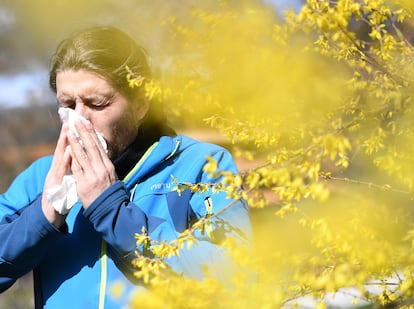How to survive spring with a pollen allergy
Experts recommend wearing a facemask, hanging your clothes inside and favoring the beach over the park if you want to spend time outdoors


Spring is here, and with it come the allergies and their symptoms: runny nose, congestion, tearing, itchy nose, sneezing and more. Millions of people in the world are allergic to one or more types of pollen. Are you one of them? EL PAÍS consulted with some experts to get the best advice on how to cope with this season.
Juan José Zapata, president of the clinical aerobiology committee of the Spanish Society of Allergology and Clinical Immunology, describes “allergy” as a problem of the immune system that makes people sensitive to elements that should be tolerated. In this case, pollen releases substances that can cause the mucous membranes to swell; this should not cause symptoms in most people, or only very mild. However, the quality of life of those who are affected can suffer greatly, says Ana Martínez-Cañavate, president of the Spanish Society of Clinical Immunology, Allergology and Pediatric Asthma.
Can you only have allergies in the spring?
First you need a good diagnosis to find out which pollen is causing the allergic reaction. Contrary to what many people think, this pathology does not occur only in the spring; the concentrations of pollen are higher during this season, but it is part of the environment all year round. Mugwort, for example, pollinates in December and January, says Zapata. Additionally, Martínez-Cañavate explains that allergies are ceasing to be seasonal and are becoming “more perennial” as a result of climate change and global warming.
What can you do when you go out?
Both experts agree that taking walks in the countryside or the park should be avoided during this time of year, especially on days with high levels of pollination. Instead, they recommend the beach, as the air is humid and there is less pollen.
Wearing a facemask is also recommended when going out, preferably high-filtration masks such as the N95, as well as sunglasses to prevent pollen from coming into contact with your eyes, says Martínez-Cañavate. In addition, when you return home, you should wash your eyes and mucous membranes with saline solution to remove any traces of pollen.
How should you act at home?
The allergist denies the myth that noon is the best time to air the house. Quite the contrary: she recommends doing it first thing in the morning or after 9.00 or 10.00 pm, and keeping the windows closed after 10.00 am. “It’s in the hottest hours when the flowers open the most and expel more pollen,” she explains.
A little water can be sprayed after ventilating the rooms, so that the environment picks up a little humidity and there are no suspended particles. You can also use a humidifier, but only for a short time, as it can cause the opposite effect: the environment may become too humid, causing the proliferation of mites and fungi, which can also cause allergies, warns Martínez-Cañavate. If you have air conditioning at home, make sure that it has pollen filters and that they are in good condition.
When washing clothes, it is not advisable to hang them outside; it is better to do it inside or use a dryer. “If we hang our clothes outside, pollen from the environment is more likely to stick to their fibers, and we will end up carrying it on us,” explains Zapata.
What about the car?
If you are going to travel, keep the windows tightly closed at all times and make sure that the car’s air conditioning filters are in good condition, just like at home. In addition, before getting behind the wheel, take into account that antihistamines may cause drowsiness. When in doubt, it is best to look online or consult with your doctor to learn which medications are suitable for driving.
Can you be allergic to weather change?
Both allergists refute the myth that weather changes cause allergies or increase their symptoms. “You may have other pathologies, but you are not allergic to the air or the wind,” points out Zapata. In addition, Martínez-Cañavate explains that vasomotor rhinitis can occur, which is accompanied by runny nose and sneezing, but one thing has nothing to do with the other. “You simply have a very sensitive nasal mucosa that reacts to changes in temperature.”
What treatments are there?
Zapata emphasizes the importance of taking treatments seriously. Antihistamines should be taken as soon as the first symptoms appear, even if they are very mild, so they can be as effective as possible. “If you start taking them after five days of discomfort, they will do something, but it will not be the same.” However, they are not the only measure there is against allergies. Other options, such as vaccines, can help the patient develop a tolerance to the substance that causes the allergy. They can be sublingual, injectable, pills or drops; the allergist assures that they have a very high efficiency and can make the pathology disappear. In the case of children, adds Martínez-Cañavate, vaccines can make them stop experiencing the symptoms before reaching adulthood.
With a well-organized strategy, patients can get through the season with just minor discomfort; some may even only need antihistamines for the three or four days with the highest levels of pollen, concludes Zapata.
Sign up for our weekly newsletter to get more English-language news coverage from EL PAÍS USA Edition
Tu suscripción se está usando en otro dispositivo
¿Quieres añadir otro usuario a tu suscripción?
Si continúas leyendo en este dispositivo, no se podrá leer en el otro.
FlechaTu suscripción se está usando en otro dispositivo y solo puedes acceder a EL PAÍS desde un dispositivo a la vez.
Si quieres compartir tu cuenta, cambia tu suscripción a la modalidad Premium, así podrás añadir otro usuario. Cada uno accederá con su propia cuenta de email, lo que os permitirá personalizar vuestra experiencia en EL PAÍS.
¿Tienes una suscripción de empresa? Accede aquí para contratar más cuentas.
En el caso de no saber quién está usando tu cuenta, te recomendamos cambiar tu contraseña aquí.
Si decides continuar compartiendo tu cuenta, este mensaje se mostrará en tu dispositivo y en el de la otra persona que está usando tu cuenta de forma indefinida, afectando a tu experiencia de lectura. Puedes consultar aquí los términos y condiciones de la suscripción digital.








































